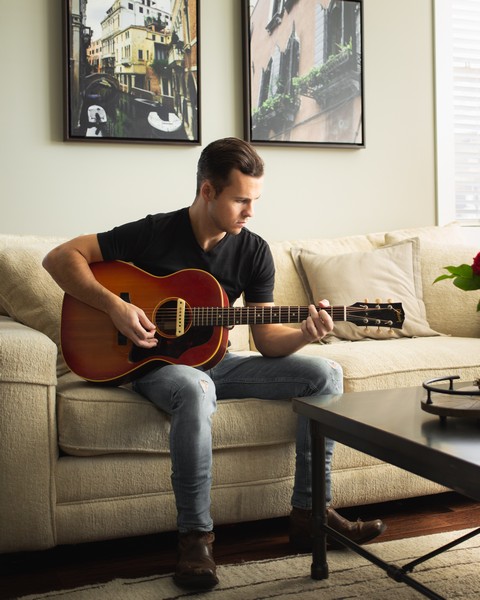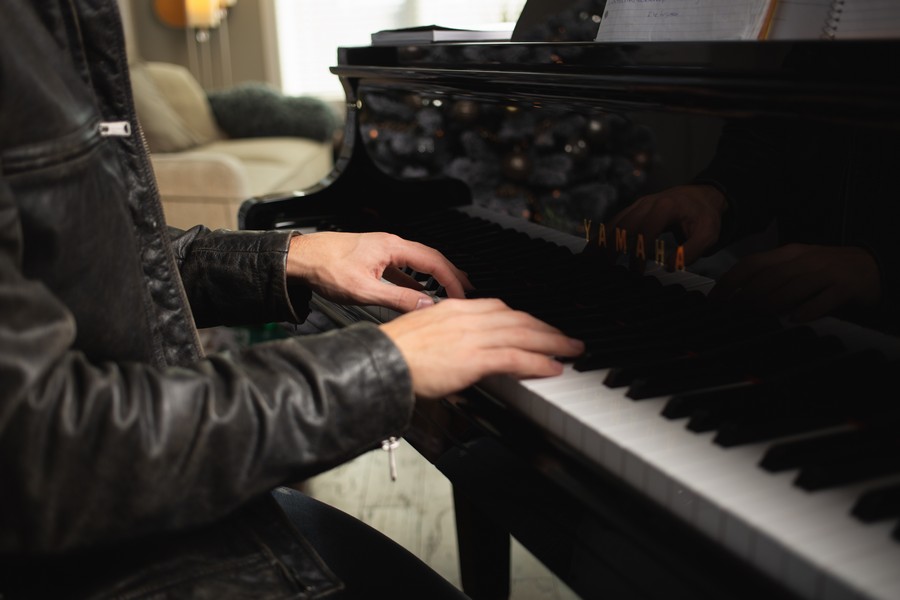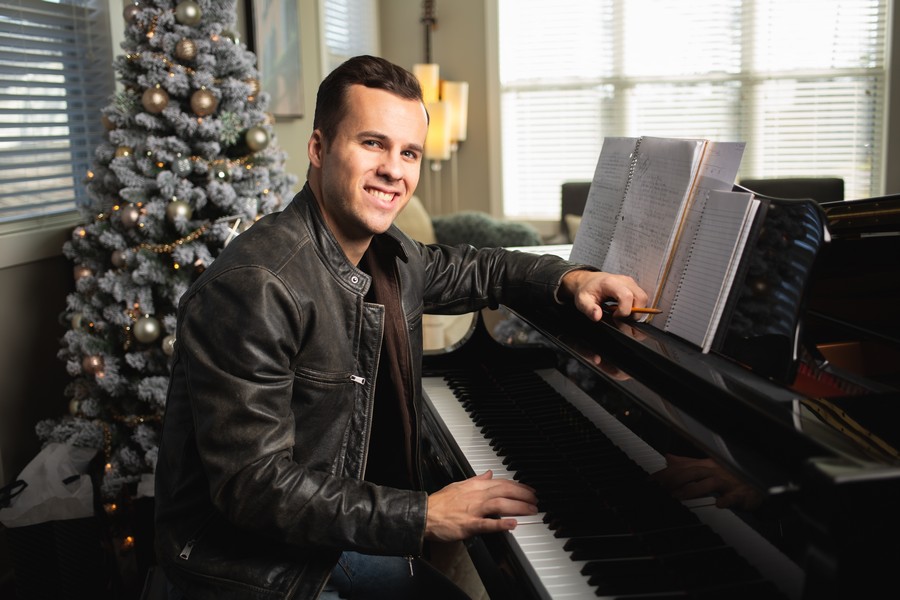Features
In 2011, Patrick Thomas (Vanderbilt) was getting the first big break of his career as one of the first blind auditions featured on the first season of the now hit TV show, The Voice. The song that earned him the attention of the judges and a spot on the show was a door- busting version of Tim McGraw’s “Live Like You Were Dying.”
In the summer of 2012, he performed the same song for over 400 attendees at the 65th Grand Chapter in Dallas, Texas as Sigma Nu’s Talent of the Year. It was a well-deserved honor, and no one left the ballroom thinking that a mistake had been made in its selection.
Little did anyone in the room know that evening that, but singing was just the tip of the iceberg of what Thomas could, and would, accomplish. It’s been a whirlwind summer for him when we speak on the phone,
but his infectious positivity passes through the phone like a snappy melody you can’t shake from your head. He’s as down-to-earth about performing at Ryman Auditorium, the Mother Church of Country Music, as he is about his recent house purchase. For someone affluent with talent, he comes across as humble and grateful, which is to be expected for the journey he’s been on.

ACT I: THE BIG BANG
Following his appearance on The Voice, Patrick returned to Nashville, Tennessee with plenty of name recognition but some other obligations to get out of the way. For starters, he still had classes at Vanderbilt University and Sunday night chapter meetings to attend.
Fairly quickly he was scooped up by one of Nashville’s bread-and- butter industries, songwriting. He worked with Cornman Music/ Warner Chappell from 2011-2013, writing songs for other artists.
Most would imagine that country music songs follow a stereotypical framework. There are story songs like “The Night The Lights Went Out in Georgia” or “A Boy Named Sue.” Then there are songs that are formed from ideas, like heartbreak, first love, or settling down. In both cases, the words usually come first. However, Thomas’ take comes from the other end.
“For me it starts with an emotion, and an emotion is generally a melody,” he shares. “The way I like to write is from an event that made me feel a certain way. Most times I’ll sit down at the piano and I’ll just play. The melody will develop and the lyrics will just follow.”
While it may seem glamorous for most to spend your days crafting songs and playing music, the catch is that compensation usually comes from who buys your songs and how successful those songs are. It’s a process that can take thousands of hours of work. It is a lonely path that is often fraught with the unknown.
So, while Thomas was up writing songs every day at 10 a.m., he was usually doing so after a long night at Nashville’s The Big Bang Dueling Piano Bar with the city’s other bread-and-butter industry: live music on the neon-and-honky-tonk-lined Broadway. It was a safe and steady gig. It had health insurance, a 401K, and it was a steady source of income thanks to two key demographics: tourists and bachelorette parties. “Truly, 30-40 bachelorette parties every night paying $40 minimum to get their bachelorette on stage.”
“It takes an immense amount of work,” he reminisces. “The hard part is memorizing the lyrics and knowing one or two songs by every possible artist you can think of. That took hours and hours of work.” Someone pays to hear Hall & Oates? You may not know “Rich Girl” but thankfully you know “You Make My Dreams Come True.”
But the gig also filled Thomas’ toolkit. It taught him stage presence, improv, work ethic, and musical talent range. Performing for a different audience each night meant bringing you’re best but also finding time to recuperate from four hours of non-stop singing. “I couldn’t speak Sunday and Monday just to rest my voice. It was brutal, and I respect anyone that does the downtown four-hour gig.”
ACT II: GOING ALL-IN
By the time 2017 rolled around, Thomas had ended his songwriting publishing deal but was still playing at The Big Bang.
He also picked up side-gigs in the music industry such as working with the Nashville Symphony, anything to expand his repertoire and bring in extra money. He wanted more than just writing other people’s songs.
Songs neatly packaged in what is commonly referred to as the “Nashville sound.” Country music blended with soft rock and pop, evolving from an earlier history of a rock, pop, and country fusion from the 1950s. While archetypical and successful, it wasn’t his sound.
So, in 2017 he began working on his own self-titled EP. The backer? Himself.
“It meant me putting money towards the album instead of a down-payment on a house. There’s an incredible amount of money involved in even five songs and an incredible amount of pressure to get it right.”
It took him weeks to get the song list right. He was only able to afford one day in the studio and so everything had to be right. Unlike a lot of albums, there wouldn’t be time to go back and do extra instrumental parts and if something extra did come up, it came out of his pocket.
The biggest pressure he faced, as if the money wasn’t enough, was to get the sound of the band right. “If I dropped their names anyone in Nashville would know who they are. The talent is absolutely there, but I still had to communicate to these guys what I want from them and what my vision is.”
“There’s no way I could be what Nashville wants me to be. It’s not me. Somehow, I have to take Nashville musicians and myself, as a Nashville artist, and not make a Nashville sound album.”
Having Grammy-award winning Producer Mark Bright certainly helped in that effort. Bright brought to the table a wealth of experience, including experience working with Carrie Underwood.
“Great guy to work with who gets my style of music. Large sound, big strings, big melodies.”
Dropping the album in September of 2017 meant even more, but exciting, work.
“That was the most exciting thing. Just touring, selling the record, and releasing the record.”
ACT III: RHINESTONE COWBOY
After dropping his album, touring, and promoting it, Thomas went head first into his next project.
“Both of my parents were Broadway performers and that’s always been there but never something I actively pursued.”
He signed with an agent and connected with Studio Tenn out of Franklin, Tennessee which was founded in 2009 by nationally recognized director and designer Matt Logan, Emmy Award-winning producer Philip Hall and Broadway and film actress Marguerite Lowell Hall. The connection led to two very different first steps into musical theatre.
The first started with a tribute to one of the forefathers of country music, Hank Williams. “The idea was to take the same Hank Williams songs and do different versions of them to highlight the power of songwriting and reimagine these songs to get to the heart of the lyrics and capture the essence of this incredible writer.”
The success of the Hank Williams tribute turned into a performance focused on Johnny Cash at Nashville’s Schermerhorn Symphony Center where Thomas worked with the Cash family. His slowed-down performance of “Walk the Line” drew the attention of audience members like Reba McIntyre, Kix Brooks, and Ronnie Dunn.
“All these shows are a theatrical concert. It’s a jam session that’s meant to feel organic and like a tribute.”

They culminated in Thomas performing on a stage that Nashville artists dream of this past summer. The Mother Church of Country Music, Ryman Auditorium. It was the same stage Roy Acuff, Johnny Cash, Dolly Parton, Loretta Lynn, Tammy Wynette, and so many other artists stepped across, illuminated by its stage lights. Hank Williams also performed on the same stage, receiving an astounding six encores.
It was a tribute to Glenn Campbell, assisted by Campbell’s family and headlined by Steven Curtis Chapman. The band from Campbell’s final album were also present to perform. Thomas was to perform one of Campbell’s most well-known hits, “Rhinestone Cowboy,” a fact that wasn’t forgotten.
As Chapman finished a song, Thomas went to put on his rhinestone jacket. His hand was holding his Dad’s 1963 Gibson guitar and as he walked on stage the moment dawned on him.
“It’s a spiritual kind of feeling up there. In the moment, on that stage, all I felt was gratitude and some connection to this other worldly thing…to what music was, who came before me, and who would come after.”
The hours writing songs, the leap of faith funding his own album, the long nights in downtown Nashville playing for Wooo-ing bachelorette parties all seemed to converge into this magical moment.
“You think you know nerves, but you don’t until you follow Steven Curtis Chapman to play one of Glenn’s most famous songs, and the songwriter is in the audience,” he quipped.
ACT IV: THE BATTLE OF FRANKLIN
The second project that came from his connection with Studio Tenn was in an entirely different direction but were familiar waters.
Working with local Franklin historians, Studio Tenn embarked on a journey to tell the story of the Battle of Franklin through musical theater. The battle was a pivotal moment for middle Tennessee’s role in the Civil War and the story centered on Tod Carter, a Confederate Army officer who would be mortally wounded less than 500 yards from his own home. The piece also told the story of the slaves seeking their freedom, the soldiers on each side, and the citizens of the town caught in the middle of the deadly clash.
If the name rings a bell with Sigma Nus, it’s because Founder Greenfield Quarles was also wounded at the Battle of Franklin not far from where Tod Carter was, although his wounds proved not to be mortal.
Thomas’ role with the production was not to perform someone else’s songs but to serve as the sole composer and lyricist for the musical.
“It was scary because it happened really fast. I had a couple of weeks to do the whole thing, so I immediately read the script and then sat down and started playing.”
He knew from his other experiences what kind of talent he was working with.
One actresses’ angelic and naturally country voice meant a high noted song for her arrangement.
“There are songs that tell you how to feel and songs that make you feel and I wanted to write songs that helped you share the emotions of the actors without painting it all out in the lyrics.”
Working with historians who had given their insight and input on the already written script meant he already had a library of language to work from and kept most of the pieces in the time period except for one.
“Run, Run, River” is a building anthem built on the foundations of a gospel. It changes key several times as various characters perform it speaking to different moments in the musical.
“It’s a big musical theater piece that kind of comes out of nowhere and I knew it had to come back three or four times, so basically I wanted to create a song that could work when sung at different parts in the story.”
The musical opened to rave reviews and sold out crowds, prompting additional showings and plans to bring it back in a future season. Studio Tenn artistic director Matt Logan included Thomas specifically in his appreciation saying, “Patrick Thomas has done a beautiful job. As with Pete, I trust him so much as an artist, and he’s surprised me entirely with what he’s done.”

ACT V: GRATITUDE
Amidst this long journey, Thomas has remained humble, an uncommon trait for some in the Nashville-area with similar success.
He regularly expresses his gratitude for the people that inspired him like his parents and the people who keep him grounded like his girlfriend and his Sigma Nu brothers.
“Sigma Nu is my support system still. My brothers are still my best friends,” he shares. “Really what Sigma Nu is to me, it’s the real life I need and the escape from music. Sometimes you don’t want to talk to talk about music or be around musicians. These guys are my break from the music life.”
With chapter brothers across the country, Thomas stays in regular contact with them. When his album first released, they were the first people to text him congratulations.
“It’s all about gratitude. Sometimes you ask yourself ‘how am I here?’”
EPILOGUE: A QUESTION
Singer, musician, songwriter, actor, composer. It’s easy to ask if there’s anything Patrick Thomas can’t do.
A guess? Fail.